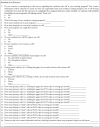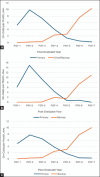A national survey of on-call responsibilities and night float systems at neurological surgery residency programs
- PMID: 40656474
- PMCID: PMC12255209
- DOI: 10.25259/SNI_85_2025
A national survey of on-call responsibilities and night float systems at neurological surgery residency programs
Abstract
Background: In 2003, the Accreditation Council for Graduate Medical Education instituted work-hour requirements for residents, and since that time, the response from the academic neurosurgical community has been varied. To meet these requirements, some neurosurgical training programs have implemented night float systems, but the scope of these changes remains undefined.
Methods: We conducted a nationwide survey of neurosurgical residency training programs to evaluate the on-call structure and responsibilities of neurosurgery residents to elucidate a better understanding of the demands faced by trainees and programs alike.
Results: Seventy-four neurosurgery residency training programs (67.28%) comprising 1,107 residents were represented in our data; 23 (31.08%) of these programs reported having a night float system. Compared to programs with a traditional call system, those with a night float system had a significantly higher number of residents (17.74 vs. 13.71; P = 0.0079) and covered a significantly greater number of hospitals on call (3.07 vs. 2.21; P = 0.0150). There was no significant difference in the presence of a night float system between programs with advanced practice provider support on call (P = 0.177), Level I trauma center coverage (P = 1.000), and pediatric hospital coverage (P = 0.507).
Conclusion: Across the country, larger neurosurgical training programs with greater hospital demands have more readily adopted night float systems. The integration of advanced practice providers to enhance resident education and ensure the continuity of care emerges as a prominent trend that programs are utilizing to adapt to a changing healthcare landscape.
Keywords: Accreditation Council for Graduate Medical Education; Duty hours; Neurosurgery; Night float; On call; Survey.
Copyright: © 2025 Surgical Neurology International.
Conflict of interest statement
There are no conflicts of interest.
Figures



References
-
- Accreditation Council for Graduate Medical Education ACGME program requirements for graduate medical education in neurological surgery. 2023. Available from: https://www.acgme.org/globalassets/pfassets/programrequirements/160_neur... [Last accessed on 2024 Mar 11]
-
- ACGME international glossary of terms Available from: https://www.acgme-i.org/accreditation-process/glossary [Last accessed on 2025 Feb 27]
-
- Babu R, Thomas S, Hazzard MA, Lokhnygina YV, Friedman AH, Gottfried ON, et al. Morbidity, mortality, and health care costs for patients undergoing spine surgery following the ACGME resident duty-hour reform: Clinical article. J Neurosurg Spine. 2014;21:502–15. - PubMed
LinkOut - more resources
Full Text Sources
Miscellaneous
